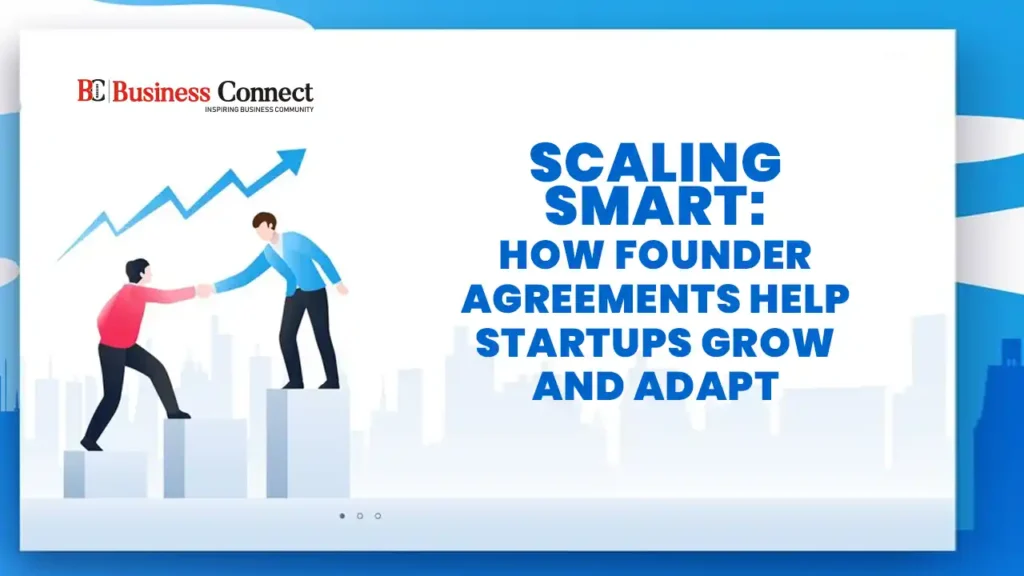Written by- Jaya Pathak
Understanding Founder Agreement
A founder agreement is a legal agreement between the co-founders of the company while setting up a business. In this agreement, the roles, rights, duties, responsibilities, ownership, liabilities and the investment proportion of each founder is mentioned. It can help in setting out your business in the uncertain circumstances which can affect the growth of business.
What is the objective of Founder’s Agreement?
A founder agreement is made to avoid disputes regarding business which may rise over the period of time between the co- founders.
What founder agreement matters for smart scaling?
There are various reasons which supports why founder agreement matter for smart scaling. A founder agreement must clearly define ownership and vesting schedules. This agreement defines equities owned over the period of time and protects the company if a founder departs early. It assigns intellectual property such as code, trademarks and domain names to the company which can prevent later disputes. It establishes governance and decision rights by detailing the manner in which major decisions will be made. It also outlines exit and contingency plans to keep the start up on track.
A founder agreement demonstrates professionalism that you have anticipated the challenges and put solutions in its place. It also shows risk mitigation that you have protected the intellectual property and outlined clear vesting. It also shows a scalability that your governance models can accommodate future hiring, cofounders and board members.
As per the recent analysis, startups with robust shareholder or founder agreements secured funding 30% faster and at higher valuation than those without such documentations.
Why do you need a founder agreement?
- Even if you own the complete business, founders often bring on advisors, early employees or future co- founders. A founder agreement protects your equity and enables a vesting schedule. It makes sure that your equity is owned over time and unvested shares return to the company if you or a future partner depart prematurely.
- Startups live, grow and die by their intellectual property. A founder agreement should explicitly assign the proof existing and future intellectual property including code, trademarks, domain names company and eventually prevent any ownership disputes down the road.
- Founders can benefit by clarifying the decision-making authority especially once you seek investment. This formal agreement can you see thought against future governance gaps.
- Once you have decided to bring on investors and co-founders, then because of a formal agreement, you can facilitate future partnerships. It will help you to streamline negotiations and show professionalism to better extent. It is often seen that investors are requesting to sign founder service agreement as a part of due diligence.
- It may happen that as a founder, you may disagree with some advisors. In a formal agreement, you can include arbitration clause to resolve the conflicts swiftly and cost effectively without resorting to litigation.
- The founder agreement can include buying and selling provisions, key person insurance requirements or mechanisms for transferring your shares. It ensures that your business runs smoothly even after some unforeseen circumstances. Therefore, a founder agreement helps to plan for contingencies.
- A founder agreement signifies credibility and compliance to customers, partners and regulators. It depicts that you are serious towards your business. The compliance is particularly important for regulated industries such as health, tech and fintech specially if you want to expand your business internationally.
Components of a Founder Agreement
- It must clarify the vision as well as the mission statement. It will help to clarify the long-term objectives and align any future partners.
- You can define equity structure, vesting schedule and acceleration provisions in this agreement.
- This agreement will help you to outline the duties, authority limits and working hours.
- It will help you to assign all the intellectual property to the company and warrants originality.
- It safeguards the confidentiality and non-competency. It protects the secret of your business, hence preventing the direct competition post exit.
- An agreement will help you to specify how decisions are made, recorded and by whom.
- This will also help in dispute resolution.
- You can add termination and exit clauses to reduce mismanagement and conflict.
How can you build adaptability into your agreement?
If you want to scale smart, then your startups must remain flexible. You can build adaptability into your founder agreements through the following points: –
- You can define the manner in which the agreement would be amended typically requiring unanimous written consent to accommodate funding rounds, product direction or regulatory shifts.
- You can include dispute resolution mechanisms such as inclusion of arbitration clauses to streamline dispute resolution, save time and money compared to litigation.
- Your founder agreement must address contingency and exit planning.
How can you draft and maintain your agreement?
You can draft the agreement immediately after incorporation, before the work begins. The solo founders can seek the advice of legal counsel to avoid unenforceable or overly vague language. You can also use some trusted templates or platforms which can help you to start the process and you can tailor them as per your needs. In order to maintain your agreement, you must review and update this agreement to meet the need.
Conclusion
A founder agreement will be the backbone of your structure. It will protect your vision and intellectual property while preparing your business for growth and expansion. This agreement can save you from any costly disputes and signal to investors and partners that your venture is built on rock solid foundations. You must formalize the founder agreement for the success of your start up.
Add Business Connect magazine to your Google News feed



